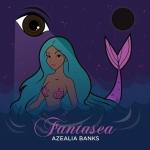
Azealia Banks Fantasea
(Polydor/Interscope)
Whether you loved hit single 212 or hated it, whether you thought Azealia Banks would never make something better or had faith in her, and whatever the year’s earlier 1991 EP did to confirm or dissuade those opinions, her most recent offering, the mixtape Fantasea, is sure to make you see Banks and her vulgar rapid-fire rapping in a new light.
Before releasing the mixtape, Banks said that “This is a test run... I tried a lot of cool things... Sounds I thought were progressive, beats made by close friends, different flows.” What that also suggests is that there are probably a lot of producers, and with 15 in 19 tracks, it’s something that she probably did not need to include. What she also said is that it’s a “first album of sorts,” but with so many different producers, the mixtape is so eclectic, going from ballads to dance-club beats to instrumental doodles and everything else, that to categorize it as such is probably to misunderstand what an album typically aims to be in terms of cohesiveness and style. L8R becomes a completely different song at the end, andthe title track turns into a completely different bass line that disappears before coming back thirteen tracks later on Azealia Skit. Even then, its presence is just a background for Banks to send out a thank you to friends, family, producers, and listeners. The production of Fantasea is all over the place.
What that means, though, is that Fantasea is a perfect place for Banks to show off her versatility, rapping to Machinedrum’s relentless beats with her trademark, “what’d she say” style before, on Luxury, slowing things down to show she can sing as well as she can rap. It’s these moments, where Banks lets a bit more emotion into her voice that the mixtape is at its best. There is no better example than on the release’s greatest track, Us, where a beat not as club-ready as many others here is, as expected, penetrated with Banks one-up lyrics, but delivered almost in a confessionary way that we would never expect. “Cause I can't entertain you/I got nothing to say to ya/I don't even blame you/If I was you I'd hate too” is her slowest and both her most vulnerable and celebratory delivery, but it’s the way she alternates her slow taunts with her motor-mouthed “talk first, think later” that really make the song, perhaps her best yet, or at least the best display of her talent. The other contender is the more dance-friendly but exotic work on Esta Noche, where the versatile DJ Munchi seems to be throwing hoops to test Banks, and she delivers by linking one bar to the next in impressive ways. Her command of tone and her own flow is on full display, and it is the best example of Banks wide-ranging style. Both suffer from an inability to escape their artists own lyrical trappings, but they epitomize everything she aimed to do with this release.
Of course, Azealia Banks would not be Azealia Banks if she couldn’t spit acid and congratulate herself, and she does that very well on the opener Out of Space, which is aided by Liam Howlett (of The Prodigy) and his characteristically unorthodox, syncopated production. Some of the more commercial attempts, such as Fuck Up The Fun and Nathan are less effective, coming off as less catchy 212 imitators, and the rhyme-game experiment of Jumanji is clearly mixtape material that would never get near an album. Still, the first few songs are a reminder that Azealia Banks won’t stop delivering dance-heavy, vulgar anti-anthems.
As one would expect from a mixtape, there are several tracks here that Banks likely threw in for fun or as an experiment. In addition to the aforementioned Jumanji and Azealia Skit, Ima Read plays like an unfinished, sarcastic address to her critics. Salute is a closer that lacks the punctuation that one would expect on a more proper album, and after Esta Noche shows Banks merging ultra-harsh production with her stilted delivery, it feels unnecessary. Still, even these tracks show an unexpected amount of depth from Banks, as they demonstrate her ability to curb her delivery around many different producers’ styles in her own way.
Fantasea certainly suffers from a lack of direction or consistency, but it also is a perfect way to silence her critics. Many of these songs are the best fusions of dance and rap you will hear all year, and the weaker tracks still display skills or strengths—and a few weaknesses—that we didn’t know Banks had. 19 tracks and 53 minutes of her hateful, limited vocabulary is a bit much, but when Banks is on, she sounds like she will never go off. Regardless of what you think of 212 or 1991 EP, Fantasea is so coated in eclecticism that you will think far more of her as a musician and MC for listening to it, even if you hate her materialist, vulgar, and, too-often, poor lyrics. Still, with such great beats and such impeccable flow in her stylish deliveries, her ineloquence can be forgiven.
21 August, 2012 - 07:50 — Forrest Cardamenis